
Volunteering: Building Skills and Giving Back through Community Engagement
Volunteering is a multifaceted activity that allows individuals to contribute to their community while also acquiring new skills. When you give your time and expertise to a cause you care about, it not only benefits those in need but also enables you to develop professionally and personally. Skills-based volunteering, in particular, is an avenue where professionals apply their specific skill sets to address challenges within nonprofit organisations.
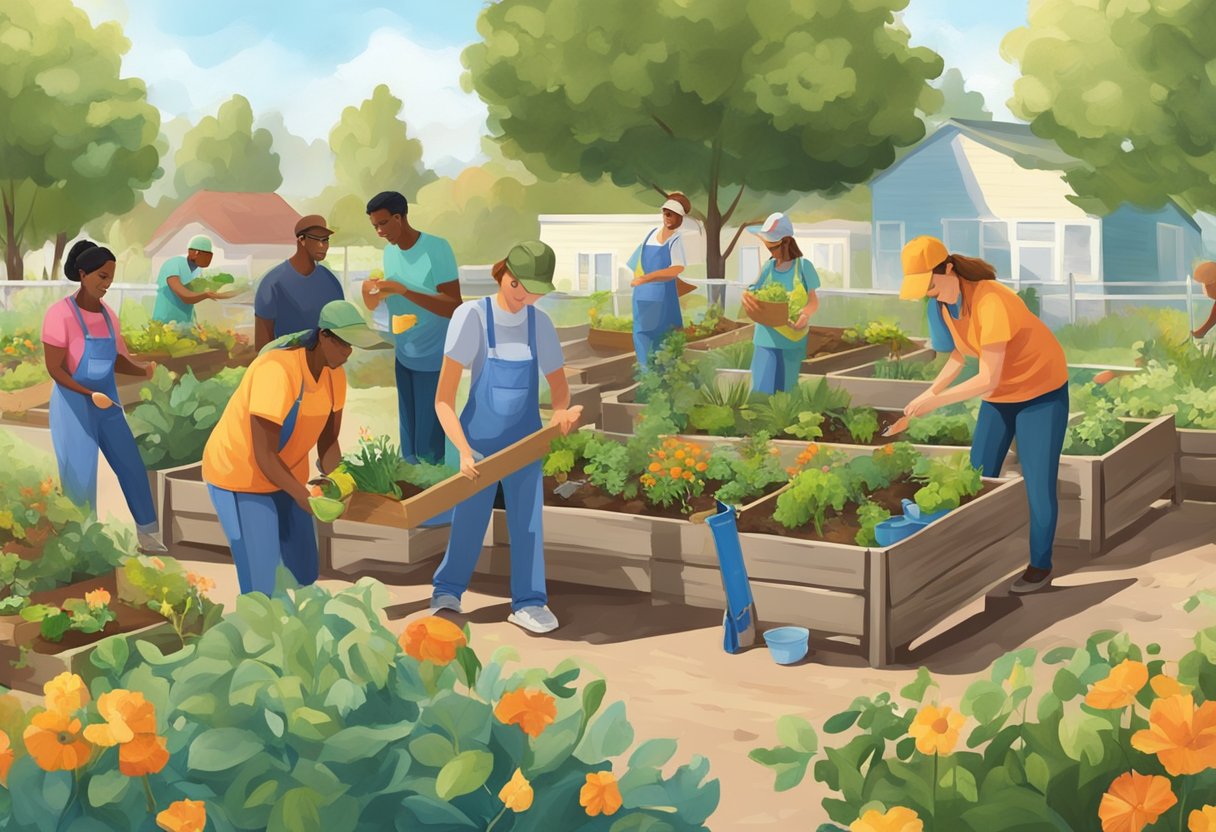
It offers a unique growth opportunity—by stepping outside your comfort zone and tackling real-world problems, you enhance your ability to adapt, collaborate, and lead. Engaging in volunteer work fosters a sense of social responsibility and a desire to contribute to positive change, which can have far-reaching effects on community wellbeing. Moreover, as you interact with different individuals and groups, volunteering becomes a profound way to build relationships and widen your network.
Key Takeaways
- Volunteering allows skills development and contribution to community.
- Skills-based volunteering broadens professional expertise and personal growth.
- Positive community impact and networking opportunities arise from volunteering.
Understanding Volunteering
Volunteering is the act of giving your time and skills to aid others without the expectation of financial reward. It’s a powerful way to engage with your community and make a social impact. In essence, volunteerism is the cornerstone of many philanthropic efforts, providing support to those in need and contributing to the greater good.
Why Volunteer?
- Community Engagement: By volunteering, you connect with your local community, meeting new people and understanding local issues.
- Skills Development: You can enhance existing skills or learn new ones, as many volunteering opportunities offer training.
- Personal Growth: Volunteering can boost your confidence and sense of accomplishment while helping others.
- Philanthropy: You contribute to important causes, driving positive change and helping to build a better society.
How to Get Started?
- Identify Your Interests: Whether it’s working with children, building homes, or environmental conservation, find a cause you’re passionate about.
- Look for Opportunities: Search for local charities or community groups that align with your interests.
- Commit What You Can: Volunteering should fit into your schedule, so decide how much time you can give.
Remember:
Volunteering isn’t just about the effort you put in; it’s also about the experience and growth that comes back to you. Whether you’re assisting in local events or contributing to international projects, your efforts help to build a more connected and resilient community. It might seem like a small contribution, but the collective impact of volunteers around the world is monumental.
If you’re a teacher or a parent looking to guide children in understanding the value of volunteer work, consider integrating real-world examples into your lessons or discussions. Share a story of how you’ve contributed to a community project or how volunteering has enriched your life. It’s these real, personal experiences that bring the concept of volunteering to life.
Types of Volunteer Work
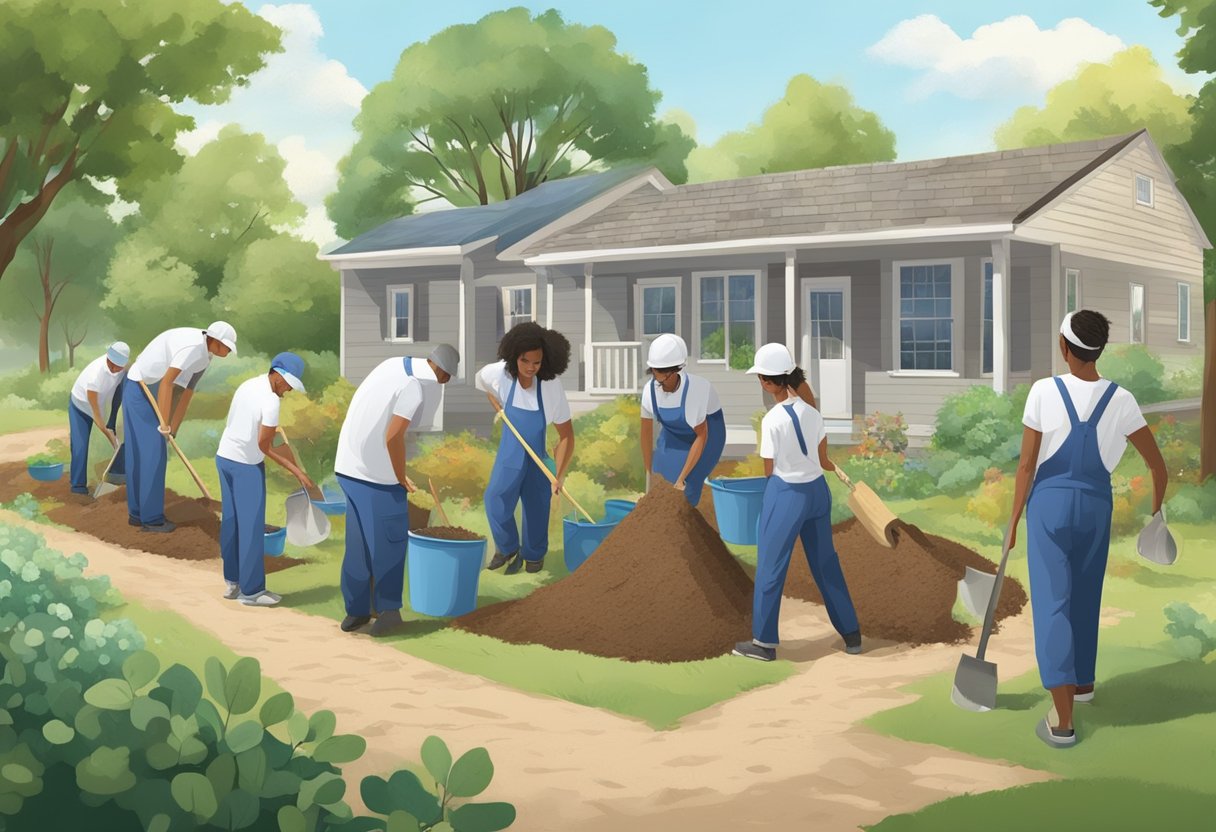
Volunteering can be an incredibly fulfilling way to give back to your community while developing new skills. Whether you’re helping at a one-off event or committing to a long-term project, there’s a type of volunteer work suited to everyone’s availability and skillset.
Event Volunteering
At the heart of event volunteering is the chance to contribute to the vibrancy and organisation of local community activities. You may find yourself setting up stands, guiding participants, or providing information at charity runs, festivals, or school fêtes. It’s a great way to be part of something exciting and meet new people, often requiring only a one-day commitment.
Long-Term Volunteering
For those who can spare regular hours weekly or monthly, long-term volunteering positions can offer a deeper involvement. You could support initiatives like mentoring young people, assisting in animal shelters, or participating in continual environmental conservation efforts. This form of volunteer work fosters enduring relationships and often allows you to see the long-term impact of your efforts in the community.
Skills-Based Volunteering
Skills-based volunteering, as highlighted in a systematic literature review, refers to the application of specific professional skills to non-profit organisations’ needs. From marketing and legal advice to IT support and business strategy, sharing your specialised skills can drastically enhance the efficiency and capabilities of charities and NGOs. It’s a two-way street; the organisation benefits from your expertise while you get to hone and diversify your experience in real-world scenarios.
Remember, whatever your interests or abilities, there is a volunteering opportunity out there that not only helps others but also supports your own personal and professional growth.
The Benefits of Volunteering
Volunteering is a multifaceted activity that not only contributes to the betterment of society but also fosters personal and professional growth. Engaging in such service enables individuals to gain new skills and insights, while simultaneously enhancing well-being and happiness.
Personal and Professional Development
When you volunteer, you’re likely to encounter situations that challenge you and encourage the development of new skills. You might learn effective communication as you interact with people of diverse backgrounds, or improve your leadership abilities by taking charge of a project. These hands-on experiences can enhance your CV, making you a more attractive candidate in your professional life.
- Gain marketable skills such as project management and teamwork
- Expand your professional network through connections made during volunteering
Volunteering can serve as a valuable bridge to the professional world, especially if you’re transitioning careers or starting out. For instance, through skills-based volunteering, you can apply your area of expertise to real-world challenges, thereby sharpening your abilities and making meaningful contributions.
Health and Well-being
Did you know that volunteering has a positive correlation with mental and emotional well-being? It’s true! Contributing your time to a cause you care about can provide a sense of purpose and satisfaction. The act of helping others can lead to a phenomenon known as the “helper’s high,” which is linked to reduced stress and an increase in happiness.
- Experience a boost in emotional well-being through the social connections made while volunteering
- Volunteering can lead to improved mental health by fostering a sense of achievement
By dedicating time to aid others, you’re also prioritising your health and well-being. The structure and social aspects of volunteering can counter feelings of isolation and depression. Moreover, regular engagement in meaningful activities through volunteering has been associated with a happier, healthier life.
Remember, sometimes the little things we do for others help us grow immensely from within. Just last week, I helped out at a local children’s centre, and the smile on a child’s face when they finally grasped a tricky maths concept was absolutely priceless. It reminded me why giving back is so important—not only does it make a difference in the lives of others, but it enriches my own in the process. So why not consider enhancing your skills while bringing joy to those around you by volunteering? Your community and your heart will thank you.
Skill Development Through Volunteering
Volunteering offers an invaluable opportunity to enhance various skills while contributing to the community. You may find that learning through service not only enriches your personal development but also boosts your employability.
Communication Skills
Through volunteering, you consistently practise and improve your communication skills, engaging with diverse groups of people. Not only do you learn to effectively convey information, but you also hone your ability to listen and empathise, key aspects of successful interaction.
Leadership Skills
Whether you’re organising a local event or leading a group of volunteers, you develop leadership skills in a real-world context. Volunteering positions can offer hands-on experiences, from small-scale teamwork to project coordination, enhancing your ability to guide and inspire others.
Problem-Solving Skills
Volunteering often involves tackling unexpected challenges, sharpening your problem-solving skills. Your adaptability grows as you find creative solutions to real-world issues, an invaluable skill in any career and in day-to-day life.
Overcoming Challenges in Volunteering
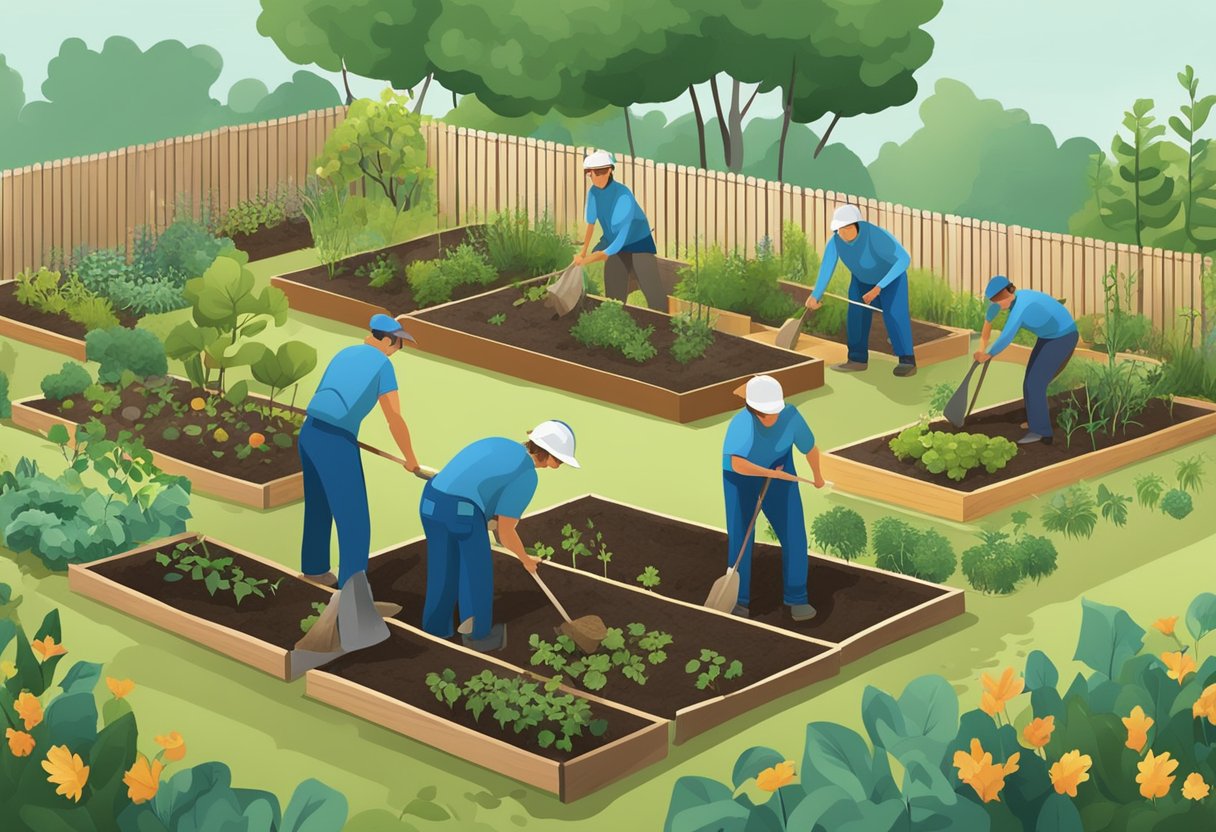
Engaging in volunteer work is incredibly rewarding, yet it comes with its own set of challenges. Addressing these hurdles effectively can enhance your volunteering experience, allowing you to give back and build skills more efficiently.
Time Management
In the world of volunteering, time management is crucial. It allows you to balance your personal, professional, and voluntary commitments without feeling overwhelmed. The key is to plan ahead and be realistic about the time you can dedicate. By doing so, you can avoid burnout and maintain a consistent level of support for the causes you’re passionate about. Prioritising tasks, setting clear goals for your volunteer time, and communicating openly with the organisers can all help you manage your time better.
Emotional Resilience
Volunteering often exposes you to situations that require a strong sense of compassion and emotional fortitude. Developing emotional resilience can help you respond to these situations with care and understanding without feeling drained. Remember, it’s okay to seek support from fellow volunteers or supervisors when faced with emotionally challenging conditions. Maintaining flexibility in your approach allows you to adapt to different situations, making your volunteer work more effective and personally enriching.
By becoming adept at managing your time and nurturing emotional resilience, you’ll be better equipped to navigate the challenges of volunteering. This not only supports your personal growth but also maximises your contribution to the community.
Creating Impact in Society
Volunteering is a powerful catalyst for positive change. It’s about more than just giving time; it’s a way to nurture skills and enact social change, cultivating stronger, more resilient communities.
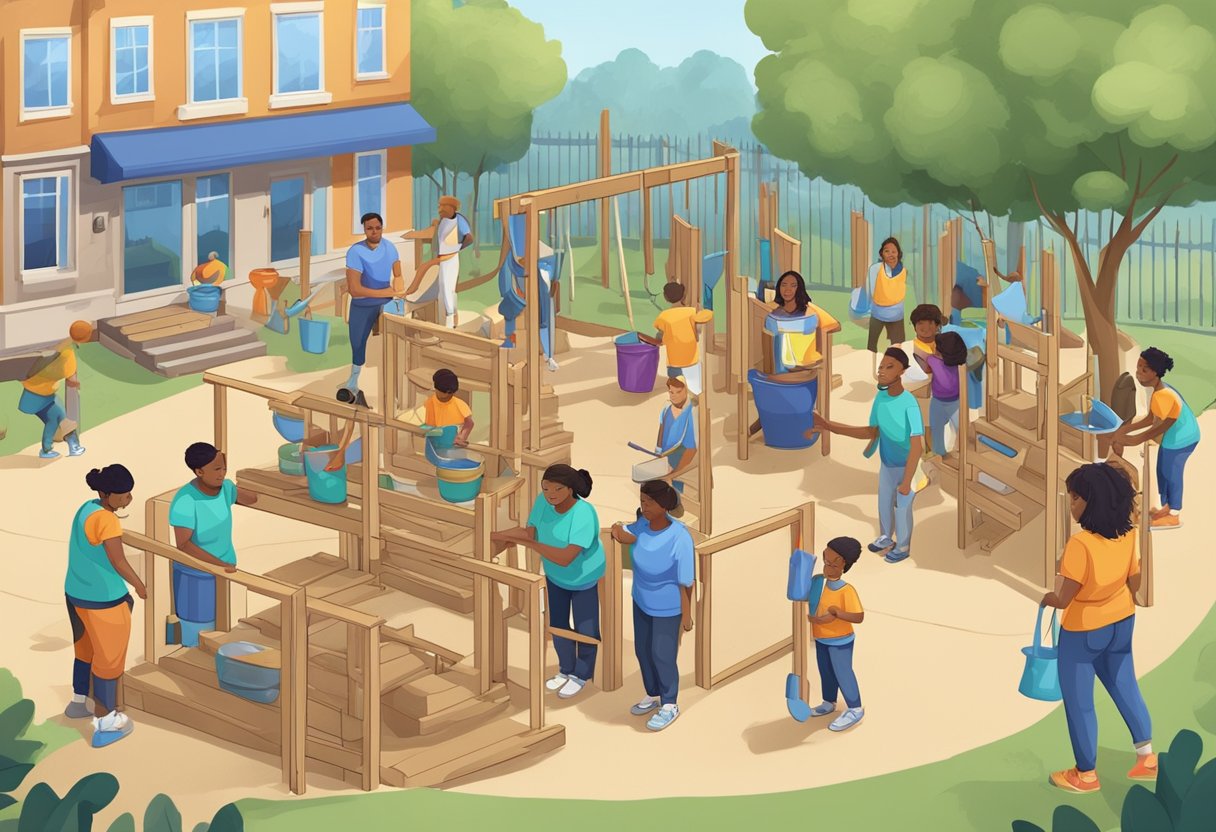
Community Development
Community development hinges on collective action—people coming together to address local issues. Empowerment is key; when individuals volunteer, they do more than complete tasks; they build the backbone of a community. For instance, organising a neighbourhood cleanup or establishing a community garden provides tangible improvements to local areas and fosters a sense of ownership and pride among residents.
Advocating for Social Change
Speaking up for social change is crucial. When you choose to volunteer, you advocate for issues that matter, pushing for impactful reforms. Take, for example, volunteering with organisations that support educational initiatives, much like LearningMole, where the goal is to create inclusive, enriching educational experiences that cater to all children, including those with special educational needs (SEN). Your actions can help ensure all children have access to quality learning materials, paving the way towards an equitable society.
Volunteering for an organisation like LearningMole might involve helping create science projects that enrich classroom experiences, thereby engendering a love for STEM subjects. Making a difference could be as straightforward as sharing your own experiences with learning and problem-solving, saying, “I remember when I found science challenging, but engaging experiments made it much more accessible and fun!”
Both volunteering for community development and advocating for social change are not mere acts of charity; they are investments in a future where every contribution, big or small, shapes a more vibrant and equitable world.
Building Relationships and Networking
When you engage in volunteering, it offers more than just the satisfaction of aiding others; it’s also a powerful avenue for networking. Each voluntary role introduces you to like-minded individuals who share similar values and interests, creating a fertile ground for meaningful connections.
Here’s how you can build relationships and networks through volunteering:
- Connect with a Purpose: Each volunteer opportunity aligns you with others who are passionate about the cause. These interactions often lead to strong professional and personal relationships.
- Expand Social Circles: By participating in different initiatives, you broaden your social networks beyond your usual circles.
- Boost Your Soft Skills: Volunteering develops empathy, communication, and the ability to work in diverse teams, which are sought-after skills in any networking scenario.
- Learn from Others: The varied backgrounds of fellow volunteers offer a wealth of knowledge and experiences you can learn from, enriching your own perspectives.
Become a Networking Pro:
- Offer Help: Use your skills to support others in your volunteering community. This generosity often comes full circle.
- Stay in Touch: Don’t let valuable connections fade away. Follow up with the people you meet, and keep the communication channels open.
- Be Genuine: Forming genuine connections over shared interests and commitments can lead to long-lasting networks.
Remember, each new person you meet could become a significant part of your network, potentially leading to future opportunities or collaborations. So don’t be shy—reach out, participate, and enjoy the journey of giving back.
Volunteering and Leadership
Volunteering offers an exceptional path for individuals to enhance their leadership abilities while contributing positively to society. Nonprofit organisations rely on volunteers for a range of crucial services and, often, leadership roles within these teams.
Leadership through Teamwork: Working closely with others on shared goals fosters teamwork, a vital component of effective leadership. Collective efforts can inspire a strategic approach, ensuring that your skills are honed with both practical and interpersonal nuances in mind.
-
Strategy and Vision: When you take part in volunteering, you’re not just doing tasks; you essentially partake in crafting a vision. You might find yourself planning events, raising funds, or even guiding newer volunteers, all of which require a systematic strategy.
-
Skills Enhancement: Your involvement in such roles polishes your leadership capabilities. You’ll learn to communicate effectively, to motivate, and to drive progress, aligning team effort with organisational targets.
Personal Growth: On this front, remember, leadership is not just about directing others. It’s also about personal growth—recognising your potential for influence and inspiring change. Think back to times when you’ve been part of a team. How did you feel after achieving something together? There’s a certain joy in collaboration, isn’t there?
Whether you’re adept at steering a project or seeking to cultivate these essential skills, giving back through volunteering is a win-win. It benefits the community and enriches your leadership journey. So, as you progress, reflect on these experiences – like how a school play requires both backstage crew and actors for the show to go on. You’ll realise these moments are building blocks to your leadership philosophy. And, dare I say, you might even find leading as natural to you as breathing!
Improving Community Well-being
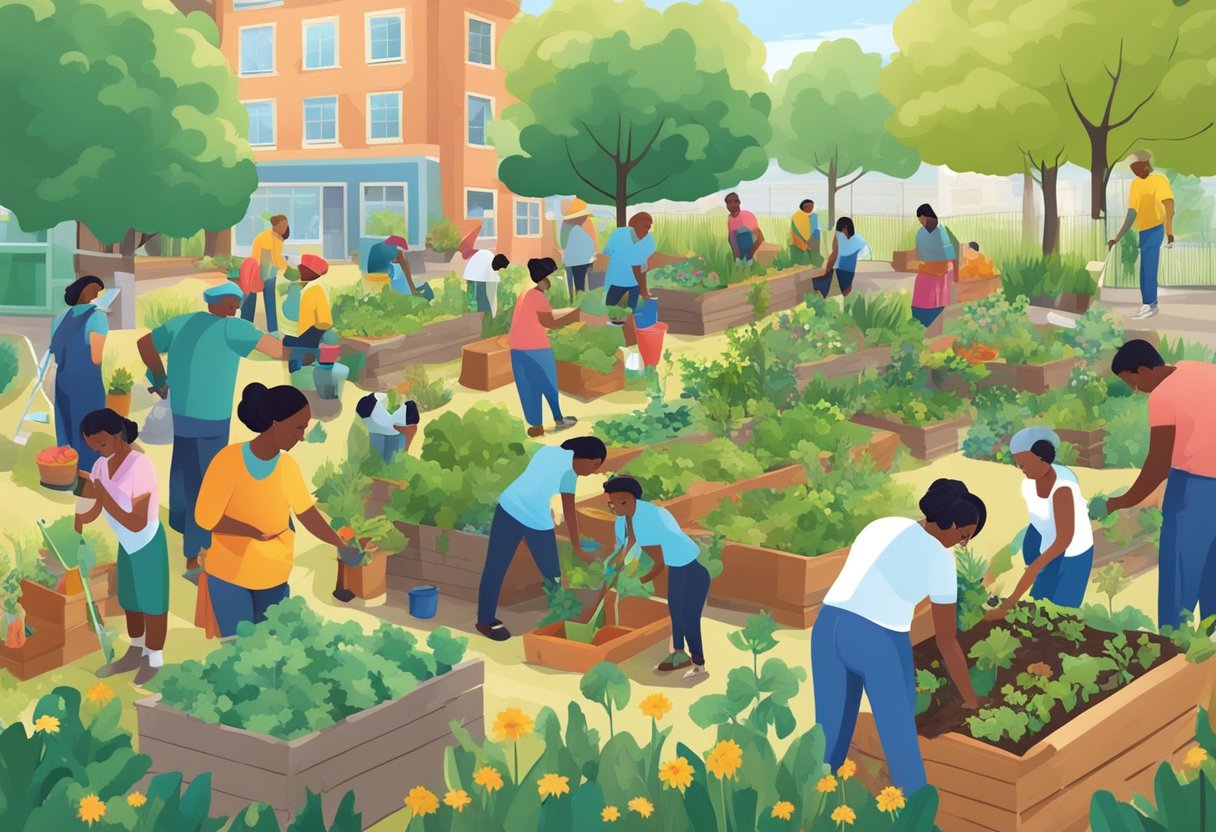
When you think about volunteering, it’s not just about the individual benefits; it’s fundamentally about improving community well-being. Stronger communities are built on the foundation of collective effort and acts of kindness. Each time you lend a hand, you’re contributing to a tapestry of support and care that enhances the lives of everyone involved.
- Connection: Volunteering helps weave a social fabric that connects diverse groups within the community.
- Support: Individual acts of kindness ripple outwards, fostering an environment where members actively look out for one another.
- Growth: With each volunteer engagement, the community develops a robust network that can tackle various challenges.
When you participate in local initiatives, your acts of kindness can manifest in numerous ways, from providing mentorship and support to sharing specific skills that enrich the collective knowledge base. Through these actions, you’re not only aiding others but also facilitating personal growth and a sense of belonging in your community.
Remember, your contributions, no matter how small they may seem, have the potential to spark positive change. Your time, effort, and compassion can transform neighbourhoods into stronger, more resilient communities. And it’s the simple joy you spread—maybe by helping a child with a reading difficulty or by tidying up a local park—that creates an atmosphere where well-being thrives.
Each individual’s involvement is critical. So next time you’re considering how you might give back, remember that your actions contribute to the bigger picture of community well-being. It’s in these shared experiences where you’ll find not just the heart of the community, but also a reflection of yourself and the power of your impact.
Engaging in Philanthropy and Social Responsibility
Engaging in philanthropy is a powerful way for you to contribute to society and instil a sense of community and belonging. Through philanthropic efforts, such as charitable donations and community projects, you’re able to address social issues and support those in need.
When you partake in corporate social responsibility (CSR), you’re not just aiding the community; you’re also enriching your own personal and professional growth. Volunteering can develop your skills in leadership, communication, and teamwork. It allows companies and individuals alike to align with their values of unity and giving back.
Consider these actions to embrace philanthropy and social responsibility:
- Support local initiatives that matter to you, fostering a sense of belonging and contributing to a unified community.
- Encourage skills-based volunteering, where your unique expertise can make a significant impact.
- Participate in team-building activities that benefit charitable causes, enhancing your collaborative skills.
Remember, every positive impact you make, no matter how small, contributes to a greater collective effort. Whether you support educational causes that enlighten young minds, or you dedicate time to local charities, your contributions foster a healthy, thriving society. Your actions echo the sentiment that we are all part of a broader, interconnected community.
Have you ever considered volunteering at a school or helping with a local community garden? Maybe you could lend your expertise to a charity that resonates with your passions. You’d be surprised at how much you can contribute—and learn in the process!
Frequently Asked Questions

Volunteering offers a unique blend of altruism and practicality, enabling individuals to contribute to their communities whilst simultaneously enriching their own skill sets and experiences.
How can volunteering assist in the development of new skills?
Volunteering provides hands-on experience in various fields, allowing you to acquire and practise new skills in real-world scenarios outside of formal employment or education.
What qualities are essential for effective volunteering?
Key qualities include adaptability, empathy, strong communication skills, and the drive to learn and contribute meaningfully to the cause or community you’re serving.
In what ways does volunteering contribute to community enhancement?
Volunteering not only supports essential services and initiatives but also fosters social cohesion and strengthens community bonds.
What are some unexpected advantages of engaging in volunteer work?
Besides skill-building, volunteers often experience personal growth, increased self-esteem, and the joy of making a positive impact in others‘ lives, which can be an enriching experience.
How should one feature volunteer experience on a curriculum vitae?
Detail your volunteer experience by focusing on the skills you’ve developed, the responsibilities you’ve undertaken, and the achievements that parallel the roles you’re applying for.
How can one improve their abilities for volunteering roles?
To enhance your volunteering capabilities, seek out training opportunities, mentorship, and continuously reflect on your experiences to identify areas for growth.


Leave a Reply